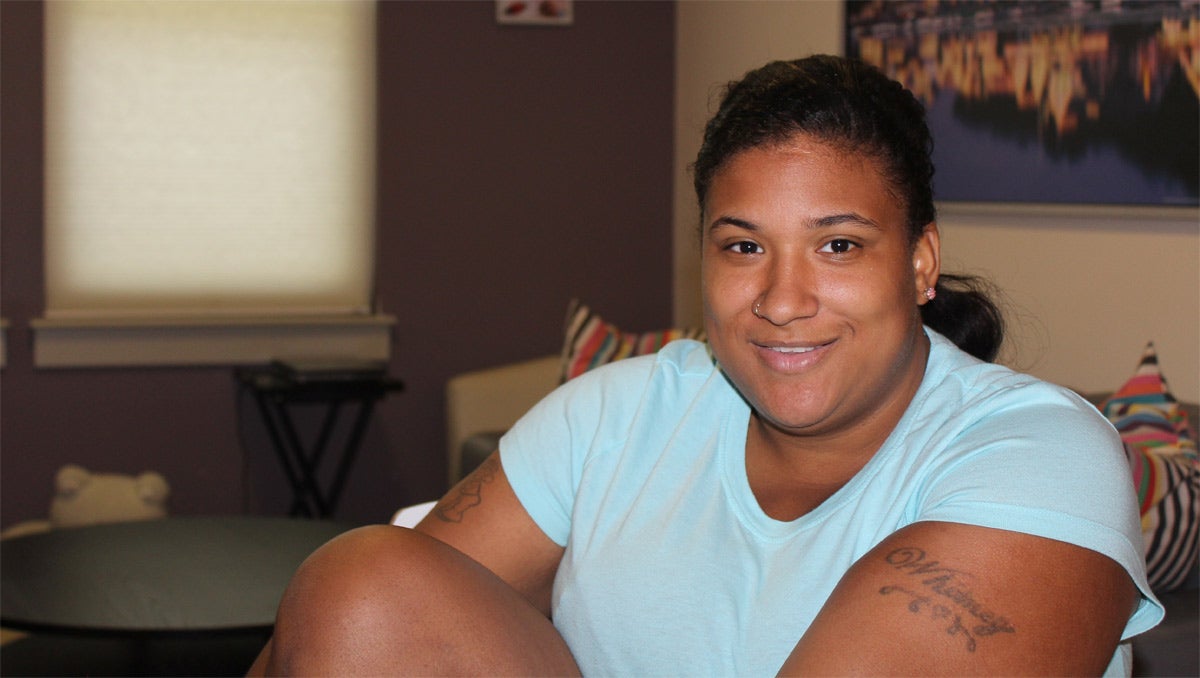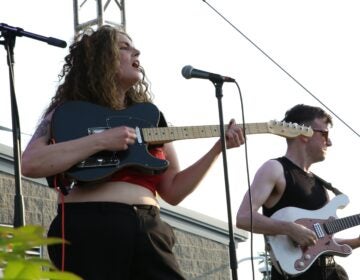Northern offers mothers a way out of child welfare system

Whitney Mallory in her new apartment on the Northern Children's Services campus in Roxborough. (Janis Chakars/for NewsWorks)
Three times in Whitney Mallory’s life, Northern Children’s Services has rescued her.
The first was after she got pregnant with her baby girl Zori. The second was after life with her boyfriend’s mother became untenable. The third was when she was evicted from her apartment after her boyfriend moved in and fought with neighbors.
At 23, Mallory’s life has been a series of fits and starts — some of her own doing and others that she had little or no control over. But each time Northern held out a safety net.
“They helped me become a better person, a better parent,” said Mallory. “If you are in a bad spot, Northern is always here.”
Since its founding in 1853, Northern has offered a home for children and their families in turmoil, and put them on the road to self-sufficiency, something Mallory had always wanted. After moving to its current location in 1923, it has housed as many as 100 children at a time, seeing them as “the innocent victims of social poverty,” according to its website. It began as a residential program, but has cut back, housing a limited number of families on its campus and offering services directly to the community.
Currently, there are 21 mothers with 27 children living on its campus in Roxborough. Altogether, it serves 3,000 children.
Mallory, a woman whose story is written in her tattoos, has been in and out of Northern since she was an adolescent. Now, she and her two children — Zori, almost 5, and honored in ink on her arm, and Darrien Jr., 2, scribed on her leg — live in a two-bedroom furnished apartment in a renovated mansion called Merrick Hall on Northern’s campus.
It is the only home that her children can remember and a consistent refuge for Mallory, who has lived in many places.
A good situation turns bad
She grew up in Germantown with her father, stepmother and step-siblings (they are represented in tattooed stars falling down her neck) in a happy three-bedroom rowhouse with family dinners and the constant patter of children. When she turned 13, her parents divorced, and she was asked to choose whom she wanted to live with. She chose her father because he was blood, but things did not go well. He saw her as disobedient; she saw him as tyrannical.
“It hurt,” she said. “There was no communication.” She started skipping school, and that’s when she had her name tattooed on her left arm. Her father called it quits.
“Next thing I know I was dropped off at [the Department of Human Services headquarters],” she said. “He dropped me off with no clothes, nothing. I said I want to go home. They said you can’t go home.”
Mallory bounced around group homes — Saint Vincent’s Home where she was placed the day after her father dropped her off; Children’s Baptist Services, Presbyterian Children’s Village — until a foster mother in Southwest Philadelphia took her in. She was removed after a physical altercation with the woman. She was then placed in another foster home, where at age 17 and a student at John Bartram High School, she became pregnant with Zori (whose birthdate is tattooed in her ear).
First arrival at Northern
Becoming pregnant with Zori meant another move. First, Mallory entered Saint Vincent’s maternity program, and finally in 2010 she came to Northern, which had been offering services long before the creation in 1919 of Philadelphia’s Department of Public Welfare, the predecessor to the Department of Human Services.
Northern is significant for the comprehensive breadth of its services. Its history reflects the evolution of the child welfare system: From its origins as the Northern Home for Friendless Children, essentially an orphanage, to a Community Umbrella Agency that provides a range of behavioral health programs, foster care and adoption services, and specialized residential programs.
Mallory’s experience mirrors the scope of these services and recalls the first mission of Northern – to create a home for children in need.
She was placed in the Generations I program for mothers as young as 14 and old as 21 who are in Child Protective Services. It offers supervision, life-skills training, therapy, child care, parenting classes and vocational planning. The goal is to move from dependency to self-sufficiency within two years.
It is one of three programs: Generations I, the largest with 12 mothers and 13 children, is supervised living. Generations II, with five mothers and six children, is transitional living for mothers 18 to 24 who have lost their homes and need help transitioning out of the child welfare system. New Generations, with four mothers and eight children, is permanent living.
The Generations I program had strict rules that Mallory found stifling. Since she was already 17 years old, she wanted more independence. “You can’t go out. You must be back right after school. There are no day or weekend passes,” she recalled.
So as soon as she could, she moved in with her boyfriend Darrien McCabe, Zori’s father (she has a tattoo of his name), his siblings and his mother.
Second stopover at Northern
The house was crowded and fights broke out, so she returned to Northern in 2011 and its Generations II program. She took parenting classes, got a job, and looked for a place of her own in public housing.
When Mallory came back to Northern, she was one of 269 children across the city “reentered to dependency,” according to a DHS Community Oversight Board report. They tend to come back because of “life circumstances,” noted Barri Morgan, Northern’s director of residential services.
After 21 months, Mallory got an apartment in Spring City in Chester County, where she quickly found a job at a fast-food restaurant. She reveled in the little things that came with independent living. For the first time since she was 13, she could open the refrigerator whenever she wanted.
McCabe soon joined her, but trouble arrived when he started “interacting” with people outside, she said. Six months and five fights later, they were evicted. After a brief stay with his mother, she was in a shelter in Philadelphia and again working at a restaurant.
A third and final stop at Northern
Fearful for her children, Mallory again reached out to her safe place in Roxborough.
Northern offered her and her children – Zori and a new baby – a spot in its New Generations program in 2014. She and the other three mothers pay modest rents and do not age out. The program offers job-readiness training, life-skills coaching and child-care services. The women can come and go as they please.
“It doesn’t feel like living in a group home. I can have company,” she said. “I can open my refrigerator.”
Mallory has started taking classes at the Community College of Philadelphia, works at a restaurant at 30th Street Station, and wants an unusual, but useful and practical career. “I know it sounds scary, but I’d like to be a mortician,” she said.
In her new apartment, the family lives a normal life in a good place. Zori has her own room and Darrien Jr. (whose name is tattooed with a baby bottle on top) sleeps in a racing car-shaped bed in a room he shares with his mother. All of the furniture in Merrick Hall was donated and assembled by Ikea and its employees. The toys, neatly organized, were bought by Mallory.
“I think I did good,” she said, proud to have found safe, stable and comfortable accommodations for her children. “Thank God, I am finally where I wanted to be – in my own apartment.”
Preparing mothers to care for themselves and their children
Morgan, who is still new to her job at Northern, has seen seven mothers discharged from congregate care, which had been Mallory’s first stop. Five are successfully living on their own or with family, while two went “AWOL,” she said. “It is amazing how they can disappear.”
Undaunted, Morgan says her aim is to prepare the mothers for success by offering everything from sex education and parenting classes to career-prep work and cultural experiences. To foster civic responsibility, she engages them in social projects, such as collecting and packing backpacks of school supplies for those less fortunate than them. “So much has been given to them. I want them to see that and give back,” she said.
Mallory is an example of Northern’s commitment and the ongoing needs of children who enter the child welfare system. And she appreciates what she has been given.
The program helped keep her family together, her highest priority. “I would not give up on my children the way my father did me,” she said.
WHYY is your source for fact-based, in-depth journalism and information. As a nonprofit organization, we rely on financial support from readers like you. Please give today.




